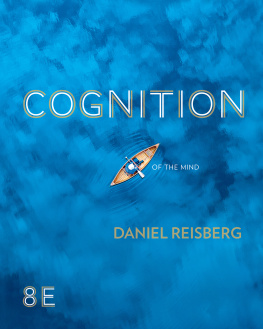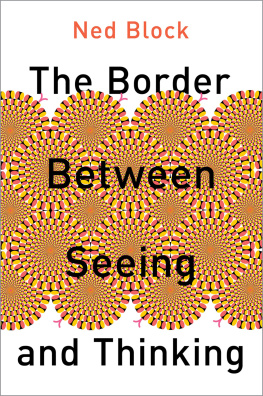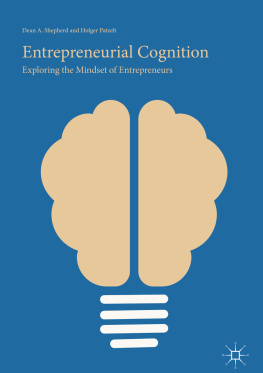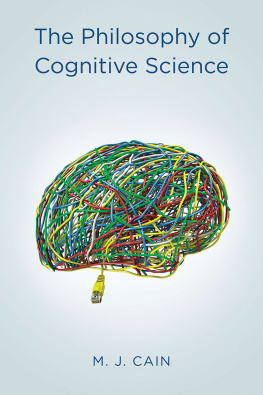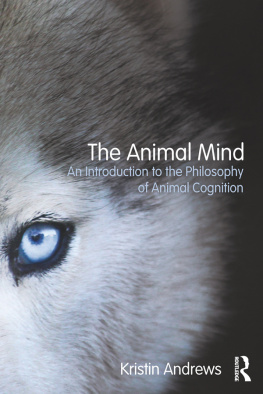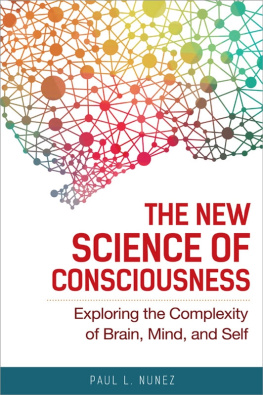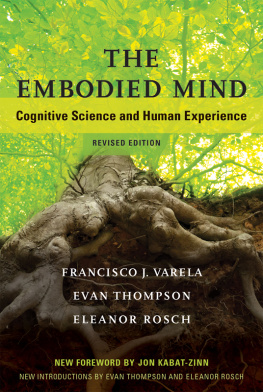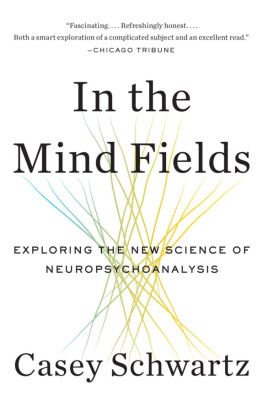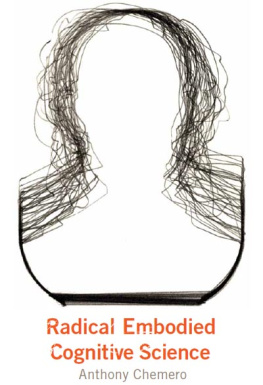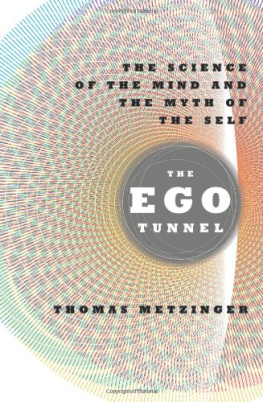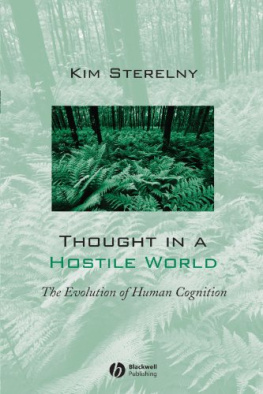Reisberg - Cognition : Exploring the Science of the Mind (9780393877403)
Here you can read online Reisberg - Cognition : Exploring the Science of the Mind (9780393877403) full text of the book (entire story) in english for free. Download pdf and epub, get meaning, cover and reviews about this ebook. publisher: W W Norton College, genre: Religion. Description of the work, (preface) as well as reviews are available. Best literature library LitArk.com created for fans of good reading and offers a wide selection of genres:
Romance novel
Science fiction
Adventure
Detective
Science
History
Home and family
Prose
Art
Politics
Computer
Non-fiction
Religion
Business
Children
Humor
Choose a favorite category and find really read worthwhile books. Enjoy immersion in the world of imagination, feel the emotions of the characters or learn something new for yourself, make an fascinating discovery.
Cognition : Exploring the Science of the Mind (9780393877403): summary, description and annotation
We offer to read an annotation, description, summary or preface (depends on what the author of the book "Cognition : Exploring the Science of the Mind (9780393877403)" wrote himself). If you haven't found the necessary information about the book — write in the comments, we will try to find it.
Reisberg: author's other books
Who wrote Cognition : Exploring the Science of the Mind (9780393877403)? Find out the surname, the name of the author of the book and a list of all author's works by series.
Cognition : Exploring the Science of the Mind (9780393877403) — read online for free the complete book (whole text) full work
Below is the text of the book, divided by pages. System saving the place of the last page read, allows you to conveniently read the book "Cognition : Exploring the Science of the Mind (9780393877403)" online for free, without having to search again every time where you left off. Put a bookmark, and you can go to the page where you finished reading at any time.
Font size:
Interval:
Bookmark:

Please note that this version of the ebook does not include access to any media or print supplements that are sold packaged with the printed book.

W. W. Norton & Company has been independent since its founding in 1923, when William Warder Norton and Mary D. Herter Norton first published lectures delivered at the Peoples Institute, the adult education division of New York Citys Cooper Union. The firm soon expanded its program beyond the Institute, publishing books by celebrated academics from America and abroad. By midcentury, the two major pillars of Nortons publishing programtrade books and college textswere firmly established. In the 1950s, the Norton family transferred control of the company to its employees, and todaywith a staff of five hundred and hundreds of trade, college, and professional titles published each yearW. W. Norton & Company stands as the largest and oldest publishing house owned wholly by its employees.
Copyright 2022, 2019, 2016, 2013, 2010, 2006, 2001, 1997 by W. W. Norton & Company, Inc.
All rights reserved
Editor: Sheri L. Snavely
Senior Associate Editor: Gerra Goff
Project Editor: Taylere Peterson
Manuscript Editor: Alice Vigliani
Production Manager: Jane Searle
Managing Editor, College: Marian Johnson
Managing Editor, College Digital Media: Kim Yi
Media Editor: Kaitlin Coats
Associate Media Editor: Christina Fuery
Media Project Editors: Danielle Belfiore and Diane Cipollone
Media Editorial Assistant: Emilia Pesantes
Ebook Production Manager: Sophia Purut
Marketing Manager: Ken Barton
Design Director: Rubina Yeh
Art Director: Jillian Burr
Designer: Lisa Buckley
Photo Editor: Thomas Persano
Permissions Associate: Patricia Wong
Permissions Manager: Megan Schindel
Composition/Illustrations: Graphic World, Inc.
Cover design: Demarinis Design LLC
Cover photograph: Canoe in Goshen, Vermont. Caleb Kenna Photography.
Permission to use copyrighted material is included in the credits section of this book, which begins on page C1.
Library of Congress Cataloging-in-Publication Data
Names: Reisberg, Daniel, author.
Title: Cognition : exploring the science of the mind / Daniel Reisberg.
Description: Eighth Edition. | New York, NY: W. W. Norton & Company, 2021. | Revised edition of the authors Cognition, [2018] | Includes bibliographical references and index.
Identifiers: LCCN 2021022097 | ISBN 9780393877601 (paperback) | ISBN 9780393877403 (epub)
Subjects: LCSH: Cognitive psychology.
Classification: LCC BF201 .R45 2021 | DDC 153dc23
LC record available at https://lccn.loc.gov/2021022097
ISBN: 978-0-393-87740-3 (ebook)
W. W. Norton & Company, Inc., 500 Fifth Avenue, New York, NY 10110
wwnorton.com
W. W. Norton & Company Ltd., 15 Carlisle Street, London W1D 3BS
Ebook version: 8.0-retailer
With the hope of reminding people of the power and relevance of science.
I began writing the first edition of this book in 1994almost three decades ago. Working on the book, I soon found, was a glorious intellectual adventure. I had to examine my field, asking myself which claims, and which findings, were solid enough, and important enough, so that they deserved some space on the pages. I had to find ways to make the linkages clear among the various strands of research. I had to work through the challenge of finding a presentation that was orderly and persuasive. And as an extra pleasure, I wanted to find ways that (I hoped) would make the material as interesting for readers as it is for me.
Now, in 2021, were about to release the Eighth Edition, and I have to say: Working on the book, for all the same reasons, is still a pleasure. In addition, Ive now gained the further reward of watching my field evolve and advance, with new findings and new conceptualizations. But Ive also been gratified to see how many of the fields claims have remained solidly in placea strong indication of the power of our science. And, of course, Ive also been gratified by the fact that my colleagues have enough respect for the book so that theyve sustained it across these many editions.
But maybe I should begin with the real start of this journey: I was a college sophomore when I took my first course in cognitive psychology, and, remarkably, I decided almost immediately that I wanted to spend the rest of my professional life working in this domain. What was it that caught me from the very beginning? Part of the answer lies in the fact that I could see that cognitive psychologists were pursuing fabulous questions, questions that have intrigued humanity for thousands of years: Why do we think the things we think? Why do we believe the things we believe? What is knowledge, and how secure (how complete, how accurate) is our knowledge of the world around us?
But alongside of these lofty questions, I also saw that cognitive psychologists were simultaneously pursuing more immediate, personal issues: How can I help myself to remember more of the material that Im studying in my classes? Is there some better way to solve the problems I encounter? Why is it that my roommate can study with music on, but I cant?
And there was morebecause cognitive psychologists were also asking questions with powerful implications for society. For example, when eyewitnesses report what they saw at a crime, should we trust them? If a newspaper raises questions about a candidates integrity, how will voters react?
Of course, as a college student and even more so now, I wanted more than interesting questionsI also wanted answers to these questions, and this was another reason I found cognitive psychology so exciting. Indeed, now looking back over the last years, its plain that the field has made extraordinary progress, providing us with a rich understanding of the nature of memory, the processes of thought, and the content of knowledge. There are of course many things still to be discoveredthats part of the fun. Even so, cognitive psychology has a lot to say about all of the questions just posed and many more as well. We can speak to the specific questions and to the general, to the theoretical issues and to the practical. Our research has uncovered principles useful for improving the process of education, and we have made discoveries of considerable importance for the legal system. What Ive learned as a cognitive psychologist has changed how I think about my own memory; its changed how I make decisions; its changed how I draw conclusions when Im thinking about events in my life.
On top of all this, Ive always been excited about the connections that cognitive psychology makes possible. In the academic world, intellectual disciplines are often isolated from one another, sometimes working on closely related problems without even realizing it. In the last decades, though, cognitive psychology has forged rich connections with its neighboring disciplines, and in this book well touch on topics in philosophy, neuroscience, law, economics, linguistics, politics, computer science, and medicine. These connections bring obvious benefits, since insights and information can be traded back and forth between the domains. But these connections also highlight the importance of the material well be examining, since the connections make it clear that the issues before us are of interest to a wide range of scholars. This provides a strong signal that were working on questions of considerable power and scope.
Font size:
Interval:
Bookmark:
Similar books «Cognition : Exploring the Science of the Mind (9780393877403)»
Look at similar books to Cognition : Exploring the Science of the Mind (9780393877403). We have selected literature similar in name and meaning in the hope of providing readers with more options to find new, interesting, not yet read works.
Discussion, reviews of the book Cognition : Exploring the Science of the Mind (9780393877403) and just readers' own opinions. Leave your comments, write what you think about the work, its meaning or the main characters. Specify what exactly you liked and what you didn't like, and why you think so.

